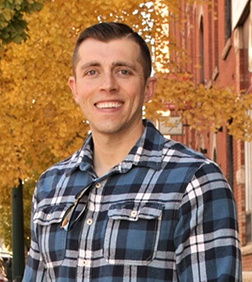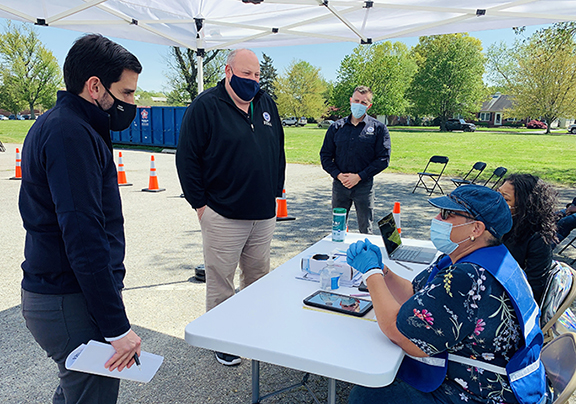
“Shots in Arms”: Zane Hadzick (MS ’12) Brings the COVID Vaccine to the Underserved in Maryland
As a Senior Supervisory Emergency Management Specialist, Zane Hadzick’s “day job” at FEMA Region 3 focuses on floodplain management. But from April until just before Memorial Day, Hadzick (MS ’12) was “boots on the ground in Maryland,” where he was assisting with COVID-19 vaccination efforts.
Hadzick’s deployment involved providing external outreach for the Maryland Mobile Mission, whose goal was to provide vaccine accessibility to historically underserved and socially vulnerable communities throughout Maryland, including high-risk individuals and those living in rural areas.

Hadzick coordinated with local, state, and federal officials and other partners to identify targeted populations and bring mobile vaccination units (MVUs) to accessible locations near their homes or work, eliminating transportation or other barriers that might make it difficult for them to receive the vaccine.
The MVUs, which are 32-foot-long box trailers that can be turned into mini vaccination centers, were set up at malls, stadiums, or other large parking areas, and allowed for the distribution of 250 vaccines each day during an approximately week-long period, Hadzick says. Also utilized were pop-up vans, which mobile outreach teams could set up and take down at smaller locations, such as nursing homes or assisted living centers. They could be driven from one location to another on any given day.
“Supporting the Maryland Mobile Mission and following the MVUs and mobile outreach teams has been an incredibly fulfilling experience and honor,” says Hadzick. “Being part of the FEMA family and watching everyone pour their heart and soul into the mission of getting the vaccine to under-vaccinated communities in a safe, efficient, and equitable manner instilled a great sense of pride in what we do.”
In order to get “shots in arms” of the most vulnerable populations—especially last April when vaccine demand still outweighed supply—the Maryland Mobile Mission wasn’t openly publicized, Hadzick says. “At the start of the mission, we didn’t advertise our location,” he notes. “We didn’t release any images disclosing our location and were mindful to exclude landmarks in images that would give the site location away. We couldn't have media on site because, as you know, the vaccine was in high demand. And if word got out, we wouldn't be able to get it to the underserved people we were working to reach.”

By May, however, when the tide began to turn and it became apparent that the vaccine supply was starting to outweigh the demand, the Maryland Mobile Mission became public, and Hadzick ramped up communication efforts focused on getting the vaccine to anyone who wanted it.
“We had to pivot quickly,” Hadzick says. “I started more actively creating social media content, talking to newspapers and radio stations, and distributing fliers door to door, telling people where to go for the vaccine.”
His “boots-on-the-ground” approach worked: To date, the Maryland Mobile Mission has vaccinated more than 15,800 people, which Hadzick finds personally gratifying. It made the long hours and being away from his family—wife Amanda Garzio-Hadzick (MS ’12) and their two daughters, Zoey and Azalea—worthwhile.
“The most rewarding experience by far has been the interaction with the people,” Hadzick says. “Hearing their sincere thanks and appreciation for what we did, and their kind and encouraging words to keep up the hard work, was so motivating. It was really one of the first times in my life where I could see the bigger picture of people coming together and working together for something so historically meaningful.”
Want to see the Maryland Mobile Mission in action?
Check out these short videos Hadzick made for Twitter while serving on the front lines of FEMA’s COVID-19 vaccination efforts.
- Watch a short Mobile Vaccination Unit tour.
- Getting out on the road: Turning a box trailer into a vaccination center.
- Moving from place to place and picking up the pace to “get shots in arms.”
- Along the way, people told Hadzick and his team what motivated them to get vaccinated.
- Working with local and county partners, as well as the state and nonprofit organizations, to reach out to rural communities in an equitable way.
- What MVU staff said about bringing the COVID-19 vaccine to areas in need.

